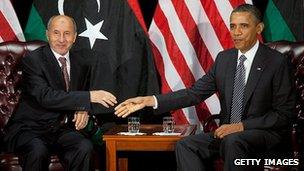Gaddafi killed: A new kind of US foreign policy success
- Published
- comments

Obama and the US have embraced the transitional Libyan authorities
"Wow", said Hilary Clinton as she was handed a Blackberry with the news out of Libya.
Gaddafi's death will be a relief to President Obama and his administration. That's on the fairly simple grounds that he backed NATO action, called for him to go, and now he's gone.
In an awkward phrase, coined by an anonymous official, the policy was "to lead from behind."
Most Americans see Gaddafi as a villain. They too will be glad he has gone.
Despite a brief rehabilitation when he chose to be on America's side during President George W Bush's war on terror, most will associate him with the Lockerbie bomb: a crazy, slightly sinister man, almost a caricature of a mad Middle Eastern dictator.
The road that led us to this day tells us a lot about Barack Obama's foreign policy as a whole, and its sometimes uncomfortable mix of idealism and realism.
A less assertive America
Mr Obama's foreign policy is driven by a sense that, particularly in the Arab world, the US must step back a pace, not be seen as a bully, always hectoring or imposing its will using physical force.
It seeks to ensure that the US crafts alliances, and does not tell friends to follow.
This is reinforced by the pragmatic belief that America cannot afford to do everything, everywhere, and must choose to do only what matters most.
Inside the White House they will be pleased that Muammar Gaddafi has gone and the regime has changed. But they will be delighted that it will be seen by the world as a victory for the Libyan people, not the American president.
Obama deliberately took the back seat during the Nato action as well. He stressed that there would be no American troops on the ground and the French and British would be leading the air sorties.
This was partly for those reasons of the perception of American power. But it was also because President Obama was repeatedly told by security advisors that Libya was not a vital national interest for the US, even if it was for Europeans. So Europeans were left to take the lead.
For ages many Europeans have argued that the US should be less assertive, but when it happened it was uncomfortable for some.
For more than 50 years "the West" has grown used to the US being out in front. It is odd when it doesn't happen.
To cajole or to lead?
But let's not go over the top. Even though they didn't shout about it from the rooftops, American forces were deeply involved.
The total cost to the US so far stands at just over $1bn. There have been 7,725 US sorties including 145 predator drone strikes. Without American involvement behind the scenes it probably couldn't have been done.
The perception of the American position wasn't all deliberate. There really was a good deal of muddle.
As so often Obama took a while to decide what to do. Crucial allies like the UK and France were kept in the dark as some argued for intervention to prevent a humanitarian crisis, while others said that America could not afford, in any sense, another military adventure in the Arab world.
In the end it was fear of being judged a moral failure that drove the decision.
The president was told that thousands could die in a massacre in Benghazi and he wasn't going to be held responsible for that.
But if President Obama's policy has been a success on its own terms, it leaves others in the US deeply worried. They don't think their country should encourage, cajole, help and guide. They think it should lead - that it should be seen to lead in fact and in deed.
And if it doesn't it is not clever - it is defeatist, and will inevitably lead to a diminution of power. They may raise their voices, not today, but when the dust settles.
There are others still who think that backing the people in the Arab world, however quietly, is paving the way for jihadist regimes that will be hostile to American interests.
Making sure they are wrong is where the state department's focus is now. The coming weeks and months will not have the drama of the events that are unfolding. They may not even be reported in detail in much of the Western media.
But the US state department is deeply involved in how Libya develops, and that will be the true test of the success or failure of Barack Obama's policy.